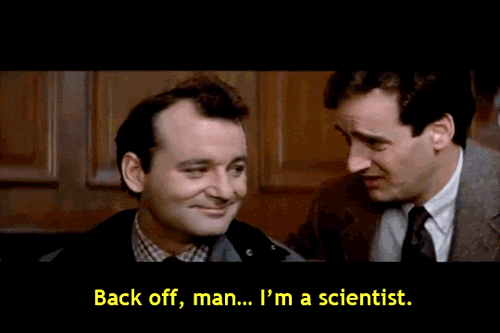The Really Big Questions
in Writing on Tufts, Blog posts
Pop science shows often make the mistake of telling us exactly how lucky it is that the universe, or the galaxy, or the Earth, or humans, actually exist at all. “With just a slight change in X, the world would be a very different place” could be a quote lifted from almost any NOVA hosted by Neil deGrasse Tyson, Robert Krulwich, or Brian Greene. Unfortunately, that often leads to the question and summary answer, “Why did the universe work out the way it did, so that life exists and we exist? Obviously because [insert deity here] made it that way.”
No. No, that is not the reason. You are the weakest link, goodbye.
I’m not going to debate the existence of your deity, but I will, in the spirit of Thanksgiving, make you feel really small and insignificant, which is the true intention of those science show quotes.
In an infinite universe, with infinite particles, there are infinity choose infinity (meaning infinity combinations of infinity particles, which comes out to an even larger infinity - yes, there are different sizes of infinities) possible ways that the universe could have ended up. It is just as likely (which is not likely at all) that grey-skinned “aliens” could have evolved on Earth and wondered why the universe “chose” them to be so special – why all the right ingredients for life (and their particular brand of life) came together at once to create them.
“It can’t have been a coincidence – we’re just too special.” Even the choice of the word “create” in that last paragraph indicates that we don’t think of the evolution of the human race as a coincidence, a step in what statisticians call a random walk (or more creatively, a drunkard’s walk), but as an ultimate end to a logical progression, with everything else leading up to the moment of our “creation.” That mindset is selfish, self-centered, and, unfortunately, the foundation of many religions.
Even though Earth can sustain life, and even though the Universe does have just enough dark matter not to fly apart, and even though the periodic table just happens to work, and even though our sun is just close enough to provide us with energy without turning us into barbecue, and even though humans evolved to eat the things around them, who says these aren’t all coincidences? Why couldn’t they be? Why couldn’t humans have originally (or concurrently) evolved in some distant solar system and then died out? Or thrived? Or done moderately well for themselves?
The point is, no one knows. And no one is likely to know for a very long time, because the universe is, according to most estimates and for all intents and purposes short of deriving a competing model to String Theory, infinite. It’s a very, very big place and literally everything conceivable and inconceivable has happened, is happening, or will happen in it.
Many physicists now also believe that our universe is not only infinite, but is only one of an infinite number of universes within something called a “multiverse.” Imagine a massively large piece of bread (that’s the universe) inside a never-ending sliced loaf (the multiverse). That multiverse contains universes where you decided to get up on the left and right sides of the bed this morning. It contains a universe where you decided to stay in bed. It contains a universe where you died in your sleep last Tuesday. It contains an infinite number of universes for every single possible (and impossible, by the laws of our universe, but not by others) thing that could ever happen – even universes where there is (and is definitively not) a deity of some kind or another.

If we consider ourselves in our microscopically tiny corner of our universe within our infinitesimally small slice of the multiverse, the questions at the beginning of this post, “Why did the world work out so perfectly that humans were created? Why are we – Why am I – so special?” seem presumptuous, and it starts to look like you’re asking the wrong questions.
If you want to ask big, galaxy-sized questions, ask, “What other kinds of things exist or could exist, and how do we find them? How do we see things from different perspectives: humans live in three-dimensional space, what if we encounter – or have already encountered – an alien race that lives in higher- or lower- dimensional space?” (The odds are slim – 1 in 11 according to String Theory – that a randomly-selected alien race will inhabit the same dimensions as we do. Maybe that’s why we haven’t found any yet.)
If you want to ask smaller questions, closer to home, perhaps you can ask, “What can I do to help other people? And why am I doing it? Is it because I expect something, even in another life, in return, or because it’s just the right thing to do?”
So stop being so anthrocentric, stop thinking that the Universe exists just for you and people like you, and try to make the world we live in a better place.
- This post was originally hosted on the Tufts University blog Jumbo Talk